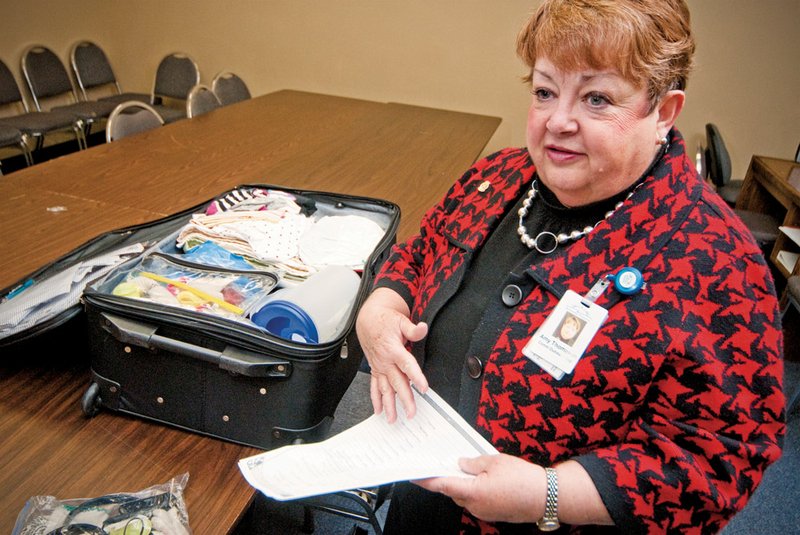MALVERN — What was once a well-lit room now seems dim in some places and bright in others. It is a struggle to see, but reaching out doesn’t help.
The sensation of touching is not right. There is either not enough feeling to identify an object, or there is a strange tingling in the fingertips.
Walking is restricted, and it hurts. Sounds are disorienting and block out what people are saying. It is hard to do the simplest tasks.
A familiar environment is now confusing, and doing almost anything becomes a frustrating struggle.
For the elderly who are living with some form of dementia, including Alzheimer’s disease, this experience has become their life.
A chance to experience that kind of life, in hopes of creating a better understanding, will be part of an open house March 7 at The Crossing at Malvern Assisted Living Facility.
“It’s our sixth anniversary, and we wanted to do something this year to educate the community about dementia,” said Mandy Ledbetter, director of The Crossing. “So many people are now dealing with someone with dementia but don’t really understand the disease. It is more than just forgetfulness.”
According to the U.S. National Library of Medicine, dementia is a loss of brain function that occurs with certain diseases. Dementia affects memory, thinking, language, judgment and behavior. The number of people with some form of dementia is expected to increase as the baby-boomer generation, the nation’s largest age segment, grows older.
Ledbetter said that as many as 80 percent of the residents of her facility have some form of dementia, and it takes patience and personal care to help them through the day.
“We have to cue them more regularly,” she said. “Some of the simple things we take for granted, they forget or have problems doing.”
To help caregivers, both professional and family members, in the community to get firsthand information on dementia, Ledbetter will present a virtual dementia tour offered by Arkansas Hospice in Hot Springs.
Ledbetter said even the most loving and sympathetic caregivers can hardly comprehend the confusion and forgetfulness that beleaguer those with dementia.
“The tour is a visceral, difficult experience that gives such a greater understanding,” said Amy Thomason, head of community outreach for Arkansas Hospice. “We had two nurses who took the tour, and it was very emotional. They cried for 45 minutes once they went through the world where many of the clients live.”
The tour is created from a kit used to simulate the symptoms of age-related dementia. It was developed by P.K. Beville, a geriatric psychologist and founder of the a nonprofit advocacy group Second Wind Dreams in Marietta, Ga.
Beville said that during the exercise, caregivers find that many behavior patterns of people with dementia actually are coping strategies.
“It is not high tech, but it does show someone what it is like to have the confusions and hardships of dementia,” Thomason said.
First, yellow-tinted goggles mimic the effects of macular degeneration and glaucoma. Not only are the goggles distorting the light, but they include dime-sized circles that allow only limited vision.
Special inserts are placed in a person’s shoes so his or her balance is off, and walking can be uncomfortable, like what is experienced by people with the pain of peripheral nerve damage. A person’s knees often are tied closely together to limit the range of motion, Thomason said.
Finally, gloves are worn that are covered with small bumps of rubber that make things harder to hold, and sometimes, fingers are taped together to make it hard to grasp objects, as though the person taking the tour has arthritis.
“We sometimes will turn a glove wrong-side-out so that the bumps are on the inside, so their hands feel odd and work even less,” Thomason.
To experience the cognitive efforts of dementia, headphones are used to listen to a “confusion tape,” which can make it harder to understand instructions and to concentrate.
“It is like listening to two
radio stations at once, although neither is coming in clearly,” Thomason said. “There is also a lot of other noise mixed in to confuse and even startle someone.”
“Our staff has gone through the tour, and they had to fold shirts and pants, match up socks,” Ledbetter said. “They found it was hard to focus. It was very eye-opening. Within five minutes, you’re overwhelmed.”
Thomason said some of the tour participants start talking to themselves to stay focused.
When asked what the subjects get from going through the tour, Ledbetter replied, “Empathy.”
“Seeing, hearing and feeling it makes a huge difference in understanding,” she said. “Caregivers will change the way they treat their charges and how they care for them.”
Ledbetter said the Malvern community is invited to the open house and the Malvern/Hot Spring County Chamber of Commerce will have its Business After Hours meeting during the open house. She is a member of the chamber’s board of directors.
She said the event is an effort to reach out to the community, especially to those who have to deal with a parent or loved one with dementia.
“So many deal with this and feel they have nowhere to go,” Ledbetter said. “A lot of family members are in denial, saying their parent or spouse is just older and forgetful, and after they see the doctor and get them meds, they think everything will be all right again.
“The news is seldom good,” she said.
For more information about the event, call The Crossing at (501) 467-8488.
Staff writer Wayne Bryan can be reached at (501) 244-4460 or wbryan@arkansasonline.com.
